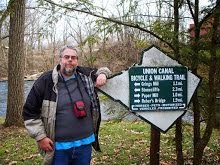Book Review: A Million Miles In A Thousand Years
(I first published this review on my Facebook page three years ago. I've expanded and clarified a point or two, but it remains very much as I wrote it in December 2010.
While a Christian-themed book by a Christian author might not seem a good fit for A Taste For The Woods, I think Miller's ideas of living your life as a story and making your goals public 'work' regardless of your beliefs, if any. Also, many scenes in Miller's book take place in the outdoors - hikes in Peru, a bike ride across the US, kayaking in Portland - and so its related to our topic. And its hard to not see the support I've received in the Backpacker Project as an example of people wanting to be part of what they see as a good story.)
It's afternoon on Christmas day, and I've finished Donald Miller's book A Million Miles in a Thousand Years. Miller is a writer who authored a memoir, Blue Like Jazz, that made the New York Times bestseller list a few years ago. During the writing of the screenplay of his memoir, Miller began to explore the idea that a person's life could be better if he viewed it as a story, a tale of a persona in conflict with obstacles who goes into action to overcome them and make a good ending.
Miller, the author of several books, is surely being coy when he claims he didn't understand how a story works. All writers tell stories. Even writing about chess, I did. There's a reason "story" is part of "history." A decade ago I wrote an article about an all but unknown chess player named Morris Freed. This Polish immigrant wasn't even a footnote to a footnote until I came across a family reference to his wanting to impress his wife by winning the chess championship of Pennsylvania. All of a sudden as a writer I had a man who was going into action to overcome whatever was in his way. That's a story.
I enjoyed Miller's book, and recommend it, but on reflecting I find I've been applying a lot of what he writes about in my own life for the past five years without realizing it. For instance, Miller describes as "choosing a different story" what I'd usually refer to as making a life change. Years ago I changed my life, or picked a better story than burying myself with a fork. And making better choices is an event as old as story itself. When my 400 pound self lay in the hospital years ago it was Dickens' miser Scrooge who came to mind, standing before his own grave and wondering what he could do to remove the words from that stone. “Men's courses will foreshadow certain ends, to which, if persevered in, they must lead," said Scrooge. "But if the courses be departed from, the ends will change.”
Obstacles, Miller writes, can be self-imposed challenges. Again, I've done it, and seen it in action. My friend Sayre Kulp at one time was notorious on Bike Forums for three word posts and 1500 word signature lines filled with his goals. Just as Miller sends out text messages that he's going to meet his long-estranged father just so he'd go through with the meeting or publicly commits to hike the Inca Trail when he's flabby round the middle, so Sayre posted his goal to ride 2000 miles back when he was north of 400 pounds simply so he could hold himself accountable. Not a new idea on Sayre's part, or Miller's, but still effective, and important to remember.
The aspect of Miller's book that had the most impact on me is how we, and our stories, interact. People like a good story, and if you 'write' one, you'll find people will join in it simply because it's good. They become part of the story, and in some ways the best part. Participating lets them not only help you, but it improves their life stories too. For example, four years ago I began to learn to ride a bike. Three years ago I completed a century, a hundred mile ride. Although it wasn't that long ago, there are many details of the ride that have faded in my memory. However, I remember my friend Dan at the finish line, cheering me as if I'd finished in sub-six hours instead of ten hours 25 minutes. I remember our first meeting, when I could barely balance and I knocked him and his bike over. And I remember the support, discussions, and arguments that took place as I improved in the months between the fall and the triumph. That's what Miller might call a good story with a good ending. (I'm writing a memoir of my weight loss, and that IS the ending I am using.) I'm pleased I lived a good story and that Dan was part of it. I'm still friends with Dan years later and I'm sure he remembers it as well.
I'll stop here. I have to go out and write the next page of my story....
Labels: Book Review


0 Comments:
Post a Comment
Note: Only a member of this blog may post a comment.
Subscribe to Post Comments [Atom]
<< Home